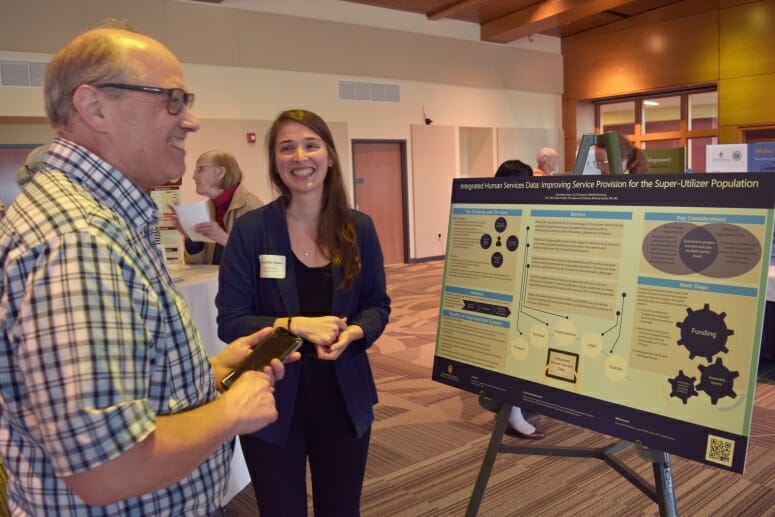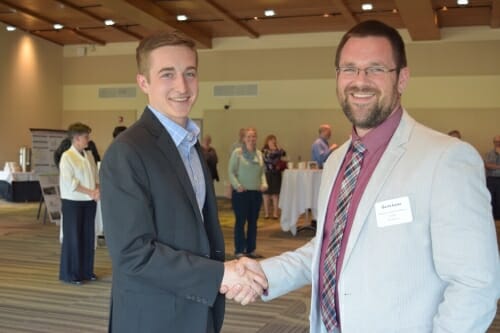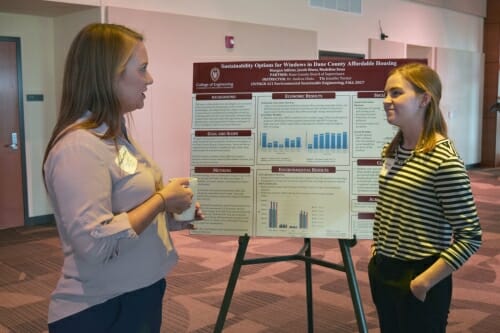
In its second year, UW–Madison’s UniverCity Year program directed 305 students and 16 faculty members across 11 departments to come up with ways to address Dane County’s housing gap, improve economic development, and protect its water quality.
On May 4, students, faculty members and the Dane County Board of Supervisors celebrated the year-long UniverCity collaboration. The program works to extend the Wisconsin Idea to the level of the classroom by pairing UW–Madison’s latest research, technology, and brainpower with local government.
“Getting two departments to do the same thing … is a miracle,” said Paul Robbins, director of the UW–Madison Nelson Institute for Environmental Studies “Eleven is because this is a good idea.”
Students and faculty from disparate schools and departments – from Engineering and Environmental Studies to Journalism and Real Estate – filled the Lake Mendota Room of Dejope Residence Hall with poster boards detailing how best to improve their community. In all, 26 projects were completed and presented.
Students from a residential real estate development class tackled affordable housing for the Village of DeForest. Senior Austin Jansen, a real estate and finance major, presented the class’ proposal for a Section 42 tax incentive program which would encourage developers to put private investment into the development of 51 units of affordable housing.

The class did a detailed survey of the land and its resources, made a trip to the village to select an ideal spot for development, and met with city officials to determine feasibility.
“This is the one opportunity where you really get to work out into the community and look at a real site and a real development,” Jansen said. “Being able to work with city officials is really valuable too – being able to get feedback on the projects that you’re doing and see the feedback you would get if you were out in the private market doing it yourself.”
Jim LaGro, a professor of Urban and Regional Planning, said the program employs a favorite teaching style of his called “experiential learning.”
He said he’s been using experiential learning to get students working on real world problems for more than two decades. The aspect of UniverCity Year that makes it stand out, though, is that it pulls departments and schools out of their “silos” and lets them collaborate.
Last semester he taught a class on urban design that looked at the populations that need affordable housing in Dane County. Each student was asked to create a profile of a typical household in the county.
“It was very perceptive. It was very emotional in terms of the stories that students told about households that might need this kind of housing, including some personal experiences of relatives who were in those situations,” LaGro said. “It was a very moving experience for me and I think for many of the students.”
This semester he taught undergraduate classes inlandscape architecture and housing and urban design.
“In both cases I think we’re really blessed here at the University of Wisconsin in terms of having very smart students, caring students, and students who have great work ethics,” LaGro said. “That’s a real luxury when you’re a professor.”

The Dane County Board of Supervisors, with its 37 elected supervisors who create policy for the county, offered real-life situations for classes to work on. Sharon Corrigan, Chair of the Dane County Board, said the projects have created buzz among supervisors who are excited by the students’ and faculty members’ plans and geared up to implement them.
“We knew we were going to get a good product, but the process has been especially exciting too,” Corrigan said. “To have this center of thinking and learning and exploration working on our problems has been really gratifying.”
The issue underpinning all projects was equity, Corrigan said. Even projects that worked to improve the water quality of lakes, for instance, were chosen because the local government wants to ensure everyone can share in the lake equally.
“Every bit of this has been about having our community be equally successful in Dane County,” Corrigan said. “And it’s not just equity but inclusion in this process from all walks of life.”
UniverCity Year is a program within UniverCity Alliance, a broader effort bridging local government, the people of Wisconsin, and UW together in order to work on public issues.
Gavin Luter, UniverCity Alliance’s new director as of April, said UniverCity Year is a realization of the Wisconsin Idea.
“This really is the heart of the Wisconsin Idea, to make sure that local government, state government can learn from the expertise on campus,” Luter said.
Last year, students, faculty, and officials worked on problems facing the city of Monona. This upcoming year, it’s Green County’s turn.
“I’m looking forward to doing some more work next year … that might bring our different skill sets and worldviews and areas of expertise together to really do some powerful stuff,” LaGro said.
Green County, located in south central Wisconsin and known for its pastoral scenery, is politically and socially different from Dane County and offers its own unique set of pressing problems, Robbins said. But the UniverCity Year model is flexible, he added, and can move anywhere in the state.
UniverCity Alliance is currently recruiting faculty for the coming semester to work on projects like reviving the county’s downtown centers, designing safe transportation routes to school, and launching cooperatives to support farmers.
May 4 did not mark the end of the relationship between UniverCity Alliance and Dane County but was merely the beginning of a conversation, Robbins said. In the future, faculty, students, and alumni will still be able to come to the table and hash out solutions to Dane County’s most urgent concerns.
Parker Schorr | University Communications